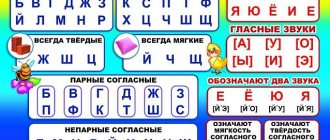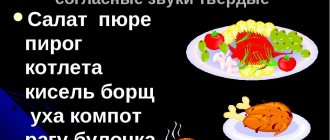Letters a, y
§13
After zh, sh, ch, shch, ts the letters a, y (and not written i, y ),
eg: sorry, Zhanna, boundary; ball, noodles; hour, candle, silent; platform, raincoat; heron, father; creepy, I'll say; noise, Shura, enormous; feeling, silent; pike, forgive me; in a row, to father.
| Note 1. In several foreign language common nouns after f, w letter is written Yu : jury, julienne, brochure, parachute and some other, rarer ones. Note 2. In some foreign-language proper names, ethnic names after f, w, c letters are written I, yu, eg: Samogit Upland, Jules, Saint Just, Zyuraitis, Siauliai, Zurich, Kotsyubinsky, Tsyurupa, Qu Yuan, Tsyavlovsky, Qianjiang, Qiang (nationality). In these cases, the sounds conveyed by letters f, w, c, are often pronounced softly. The letters yu and i are traditionally written after h in some surnames ( yu - mainly in Lithuanian ones), for example: Čiurlionis, Steponavičius, Mkrtchyan, Chyumina. |
↑ Contents ↑
Letters o, e, e after sibilants
Letters o, e, e in place of stressed vowels
§17
After zh, ch, sh, shch, the letter e to convey the stressed vowel e ,
eg: tin, swing, rustle, ginseng, twitter, same (name of the letter), on the boundary, about a candle, soul, sling; Zhenya, Jack, Shannon.
| Note. e after sibilants, see § 25. |
↑ Contents ↑
§18
After zh, ch, sh, shch, the letter o or e to convey the stressed vowel o .
The letter o is written in the following cases.
1. At the endings of nouns and adjectives, as well as in the suffix of adverbs -о, for example: shoulder, knife, shoulder, Ilyich, hut, cloak; boundary, rein, candle, soul, sling; stranger, big, stranger, big; fresh, hot, good, general (short forms of neuter adjectives and adverbs).
2. In suffixes of nouns:
- −ok, for example: circle, hook, cockerel, borscht, jump, push, and in derivatives from such words: circle, hook, jump, etc.;
- -onok and -chonok, e.g.: little bear, little mouse, little pebble, little barrel, little little arap;
- −nysh: uzhonysh;
- -onk (a) and -onk (i), for example: little book, little hand, shirt, vest, money, trousers, rhymes;
- −ovk (a) (in denominative derivative words), for example: siskin (female siskin), mouse (rodent), khrychovka, small thing;
- −ob (a): thicket, chischoba (forest clearing); the same in the word slum, where the suffix is not distinguished in modern language, and in the ironic formation khrushchoba, created after its model. Exception: in the word study it is written ё ;
- −otk (a): ratchet;
- −ovshchin (a): stabbing.
3. In the suffix of adjectives -nov, for example: hedgehog, brocade, penny, canvas, as well as in the nouns nanovka, -ovnik, derived from adjectives with the suffix -nov (−ev): pear and pear (cf. pear), hacksaw (cf. knife and knife version), cherry plum (cherry plum), guzhovka (drawn-drawn), punshovka (punchovka), kleshovka 'heron with a pincer-shaped beak' (kleschevoy), drachovka (drachovyi, from drach 'a kind of plane'), raincoat ( raincoat), rechovka (rechevoy), hogweed (borschovy), uzhovnik (grass-grass). The word gooseberry is spelled in the same way, where the suffix is not distinguished in modern language.
| Note 1. Denominal nouns na -novka such as melochovka, hacksaw, raincoat should be distinguished from verbal nouns such as nochevka (see § 19, paragraph 3). Note 2. In Russian surnames, the sibilant + −ov (−ev) is written o or ё in accordance with tradition and with registration in official documents: cf., for example, Chernyshov and Chernyshev, Kalachov and Kalachev, Khrushchov and Khrushchev; Emelyan Pugachev. |
4. In the suffix of adjectives and adverbs -ohonk, for example: freshly, well-honedly.
5. In place of the fluent vowel o in nouns and adjectives, for example: zhor, glutton, gluttonous (cf. eat), pulp (cf. zhmu), burn, arson, burnout, heartburn (cf. burn, burned); trouble (cf. gen. n. rod), seam (seam); knyazhon (genus plural from princess), nozhon (genus plural from scabbard - an obsolete version of the word scabbard), scrotum, scrotum (genus plural and diminutive from moshna), intestines, intestines (gender and diminutive from intestines), kvashonka (diminished from kvashnya), koshomka and koshomny (from koshma), ochochki (from glasses), ochochko (from ochko), smeshon (short form of the masculine gender) from funny); This also includes words with the suffix -ok: hook, jump (kind of hook, jump), etc. (see above, paragraph 2). However, in the words accounting, offset, calculation, account, calculation (cf. take into account, set off, begin, count, discount) the letter e (see § 19, paragraph 7).
| Note. Just like it’s funny, colloquial versions of the short forms husband are written when necessary. sort of scary, must, need. |
6. In those roots of Russian words where the vowel o after hissing ones is always stressed and does not alternate with e (in the letter e): zholknut (and pozholknut), zhoster, zhokh, zazhor (and a variant of zazhora), uzho; clink glasses, crazy, grebe, prim, clink, clink; shorkat, rustle, blinkers (and saddlery, saddler).
The word vecho (and vechoroshniy) is written in the same way, although it is related to the word vecher (and evening) (cf. § 19, paragraph 7).
with the letter o , for example: Zhora, Zhostovo, Pechora (river), Pechory (city), Sholokhov.
7. In the roots of borrowed (foreign) words. List of basic words: borjom, joker, junk, joule, major, dude, drum major, force majeure; anchovy, kharcho, choker; hood, gherkin, cruchon, offshore, torshon, shock, ramrod, shop, shorts, shorts, show; the same in proper names, for example: John, Georges, Joyce, Chaucer, Shaw, Shchors.
↑ Contents ↑
§19
In all other cases, to convey the stressed vowel o after zh, ch, sh, sh, the letter e , namely:
1. In verb endings -eat, -yot, -yom, -yote, for example: you lie, shear, bake, pound.
2. In imperfective verbs for -yovyat and verbal nouns for -yovyvat, for example: demarcate, uproot, migrate, shade; demarcation, uprooting, shading; in passive participles on -vanny, for example: demarcated, uprooted, shaded.
3. In verbal nouns on −yovka, for example: nochevka (from spend the night), uprooting, migration, delimitation, retouchevka (from retouch), peeling (from peeling).
4. In the suffix of nouns -er, for example: conductor, retoucher, trainee, boyfriend, trainer, massager.
5. In the suffixes of passive participles and verbal adjectives -yonn and -yon, for example: tense (and tense), burnt, baked, softened, detached, simplified; loaded, burnt, baked, cooked, stewed, waxed; the same in words derived from such participles and adjectives, for example: tension, detachment, simplicity, erudition, tensely, detachedly, simplified, strained, burnt, stewed, condensed milk.
6. In place of the fluent o in the verbal forms of the past tense, husband. kind: burned and prefixes (lit, burned, burned, burned, set fire, etc.; the same in participles: set fire, etc.; cf. lit, lit), -chel (read, considered, etc., cf. read, took into account), walked and prefixes (came, left, etc., cf. walked, came, left). At the same time, the writing of verb forms with the root zheg is opposed to the writing of cognate nouns with the letter o : burn, arson, burnout (see § 18, paragraph 5).
7. In those roots of Russian words where the stressed sound o corresponds in other words or forms with the same root to a vowel (stressed or unstressed) conveyed by the letter e . The following is a list of basic words with such roots (in parentheses, words with the same root or forms with the letter e after zh, h, sh, shch ).
Roots with the combination zhe :
- chewed (chew),
- gutter (gutter, groove, grooved),
- yellow (yellow, yellowish, turn yellow, yolk),
- acorn (acorns, stomach 'small acorn', acorn),
- bile, bile (cf. variants bile, bile; bile, bile),
- wives, little wife, little wife, newlywed (wife, woman, woman, female, getting married, getting married),
- perch (pole, perch, perch),
- millstone (millstone, millstone),
- hard, rigidity (hard, harsh),
- sazhenki (sazhen and sazhen),
- heavy (heavier, heavier, outdated heavier).
Roots with a combination of :
- twine (string, twine),
- evening (evening, evening),
- liver, hepatic (liver),
- honour, honorable (honor),
- bees, bee (bee, beekeeper),
- account, account, offset, report, accounting, counter, counting, offset, accounting, cross-count, even, odd, even, rosary (count, count, recalculate, set off, take into account, deduction, accounts, accountant, odd),
- cheboty (chebotar),
- bangs, bangs, chela (plural) (brow, petition, ochelya),
- shuttle (shuttles, shuttle),
- cross out, cross out, cross out, cross out, cross out, underline (cf. option cross out; cross out, cross out, cross out, cross out, cross out, underline),
- black (black, blacken, rabble, blackness, blackish),
- callous, callousness (callous, callous),
- damn, devilish, devilish (devils, devils, devilish, devilish, devilish, devilry),
- dash (detail, devil, draws, draw, drawing),
- comb, comb, comb, comb, comb, comb, comb, hairstyle, comb, comb, comb (comb, comb, comb, comb),
- clear, clarity, distinct (rosary),
- tap dancing (tapping).
Roots with the combination she :
- cheap, cheap (cheap, cheap, cheaper, get cheaper),
- koshevka (kosheva),
- wallet (wallet, wallet),
- millet, millet (millet),
- lattice, sieve (plural), lattice (option: lattice; sieve, lattice),
- silk, silky (silks, silky),
- whisper, whisper (whisper, whisper, whispers),
- wool, long-haired, short-haired (wool, woolly, woolly).
- Roots with a combination of :
- dandy (dandy, dapper, flaunt, flaunt),
- cheeks, cheek, slap, buccal (cheek, cheeky),
- tickle (tickle, tickle),
- lye, lye (slit, cracks),
- click, click (click, click),
- lye, alkali (alkalis, alkaline),
- puppy (puppy, puppy),
- brush (bristles).
| Note. However, in proper names with the roots of the words listed in paragraph 7, the letter o . In accordance with tradition and registration in official documents, the letter o in such proper names as, for example, Choboty (name of a locality), Chorny, Pshonnaya, Zholobov, Zholtikov (surnames). |
8. In the sentence n. pronouns that: about what, on what, as well as in the words how much, not at all, and; in the word more.
9. In some borrowed words, where the letter e conveys under stress a special vowel sound of the source language, o Premier's wives, Schönbrunn, Schönberg.
↑ Contents ↑
Letters o, e in place of unstressed vowels
§20
In an unstressed position, after zh, ch, sh, sh, e is written - in accordance with both the stressed e (in the letter e ) and the stressed o (in the letter o or e ).
This applies to roots, suffixes, and endings. Examples: a) tin (cf. tin), bonnet (bonnet), schenkelya (shenkel), ironing (uzhenie), tuche (candle); b) turn yellow (cf. yellow), whisper (whisper), pea (cockerel), punch, raincoat (penny, borscht), watchman (chizhom), more (cf. big), red (alien), mightier (hot) ). Some spellings with e after sibilants are not checked by the stressed position, for example: wish, stomach, gelatin, attic, stir, lisp, rough, heck.
↑ Contents ↑
§21
In a number of words of foreign origin, after zh, ch, sh, o is written in an unstressed position .
List of basic words: jonathan, jockey, juggler, majordomo, majoritarian, banjo, harmonic; chonguri, lecho, poncho, ranch, capriccio (cf. capriccio variant); chauvinism, chocolate, highway, driver; proper names, eg: Scotland, Jaurès, Chopin, Shostakovich, Boccaccio. o are also written (see § 18, paragraph 7) and forms of such words where the vowel after a sibilant is unstressed, for example: shock (from shock), torshonirot (from torshon), chokerovka (from choker), ramrod (plural from ramrod).
| Note 1. The letter o is written after sibilants not under stress in words with the prefix inter and in compound abbreviated words if it begins the second part of the word, for example: interregional, intercommunal, intersectoral, leather shoe. Note 2. The letter o after hissing words not under stress is also written in individual formations not legalized by the literary norm, for example: zhokhovaty (from zhokh), stiff (from stiff), shoroshok ('barely audible rustle'), nasvezho (from fresh, according to the sample in rough form, completely). |
↑ Contents ↑
Letters o and e after c
§22
After c to convey the stressed vowel o the letter o is written , to convey the stressed e e , for example: cluck, socle, dancer, dancer, dance, facing, crimson, face, face, cucumber, cucumbers, sheep; valuable, whole, tse (name of the letter), tsetse (fly), sheep, about the father.
↑ Contents ↑
§23
In an unstressed position after c e is written - in accordance with both the stressed e and the stressed o , for example: a) price (cf. prices), tsedit (tsedit), censorship (censor), bird (pollen); b) dance (cf. dancer), crimson (crimson), calico (pepper), bolotse (porch), bird (pollen), fingers (wise men), kutsego (cf. big), kutse (cf. good). Some spellings with e are not checked by the stressed position, for example: kiss, cellophane.
↑ Contents ↑
§24
In some words of foreign language origin, o is written q : duke, intermezzo, mezzo, palazzo, scherzo, canzonetta, zoisite (mineral), pozzolans (rocks). The word tsokotat and its derivatives tsokotane, tsokotukha (cf. tsokot) are also spelled in the same way.
| Note 1. The letter o is written after c not under stress in words with the first parts blitz, sots, special, if it begins the second part of the word, for example: blitz operation, blitz survey, social obligation, special clothing, special department. Note 2. The letter o after c not under stress is also written when conveying non-normative stress options that penetrate into written speech, for example: dancer (stress option found in poetry), sokolya (professional form of the plural form of the word sokol – socles). |
↑ Contents ↑
Letters i, s
§14
After zh, sh, ch, sch i is written (and not written s ),
eg: fat, camelina, interpublishing, tell, sew, reeds, clean, rays, shield, look.
| Note. In some foreign-language proper names, y is written h , for example: Truong Tinh (Vietnamese proper name). |
↑ Contents ↑
§15
After q the letter and or s .
The letter s is written in the following cases.
1. In the roots of words: gypsy, chicken, chick, tiptoe, on tiptoe, on tiptoe, chick-chick, chick, tskat, tskat (and in derivative words, for example: gypsy, gypsy, tsyganit, chick, chick, tsut, tsut, flick).
2. In the endings of nouns and adjectives, for example: cucumbers, streltsy, capitals, Klintsy, Lyubertsy; short, pale-faced, narrow-faced.
3. In the suffix of adjectives -yn, for example: sisters, lisitsyn, tsaritsyn, Trinity day. Geographical names are also written in −tsyn, −tsyno, for example: Tsaritsyn, Golitsyno.
| Note. In Russian surnames, i or s is written c in accordance with tradition and with registration in official documents, for example: Tsipko, but Tsybin; Kunitsyn, Kuritsyn, Sinitsyn, Skobeltsyn, Solzhenitsyn, but Vitsin, Yeltsin, Tsitsin. |
↑ Contents ↑
§16
In all other cases, the letter and c , namely:
a) in the roots of words, including foreign proper names, for example: circus, cycle, cylinder, tsigeyka, scurvy, mat, figure, shell, civilization, specificity, cyclone, barber, vaccine, revolution, tsutsik; Cicero, Circe, Zimmerwald, Cincinnati;
b) in suffixes of foreign language origin, for example: organization, electrify, medicine, calcite, publicist, skepticism;
c) after the first parts of complex and complexly abbreviated words and in sound abbreviations, for example: blitz interview, special boarding school, Central Election Commission.
↑ Contents ↑






